Centre for Community Engagement and Social Change Year End Report 2024-2025
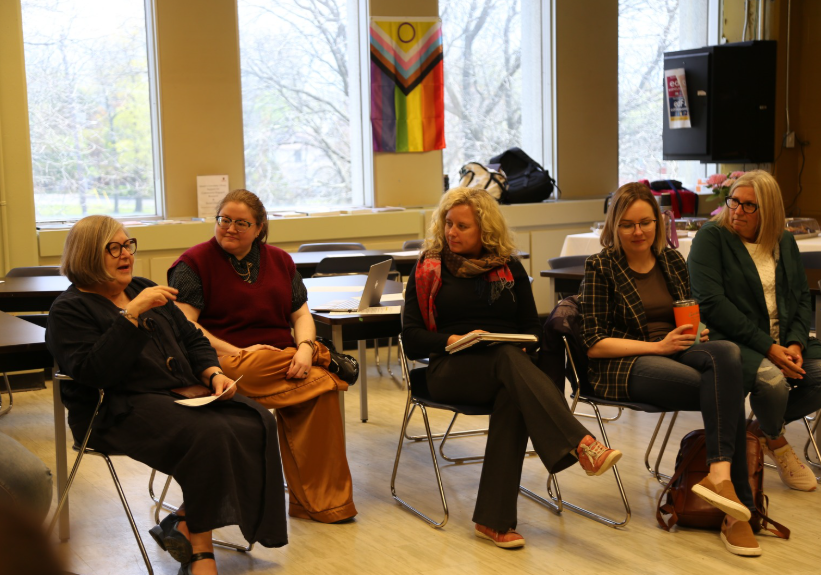
Introduction to the goal
Engaging community partners is at the heart of the CCESC’s mission to foster meaningful collaboration and impactful research. By working closely with individuals and groups, the CCESC is committed to co-developing, implementing, and evaluating research initiatives that address community priorities. This approach is rooted in trust formed in new collaborations and nurtured in long-standing relationships, creating a foundation that supports everyone involved.
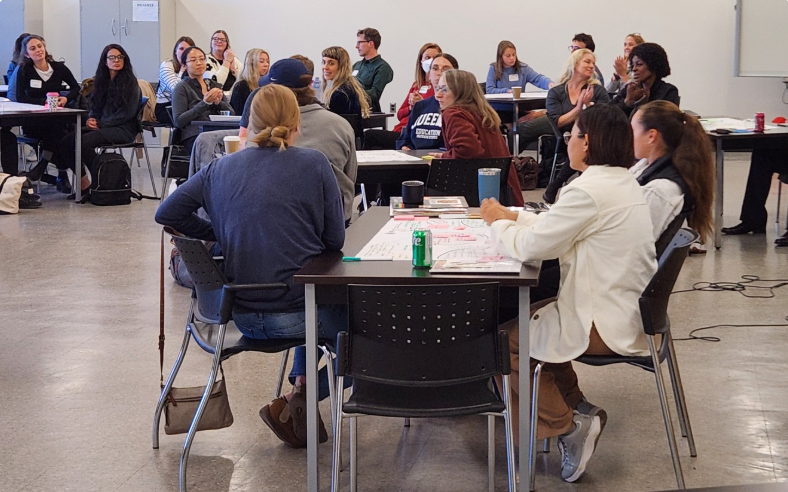
By emphasizing inclusion, equity, and sustainability, the CCESC ensures its efforts contribute to lasting change. Through high-quality events and sessions—whether in-person, online, or hybrid—the CCESC connects on- and off-campus stakeholders, promotes scholarly engagement, and builds research capacity. It also provides valuable opportunities for undergraduate and graduate students to engage in research through programs like CERCS or Amplify grants. This commitment to working with the community enriches both academic and practical outcomes.
Bringing the goal to life
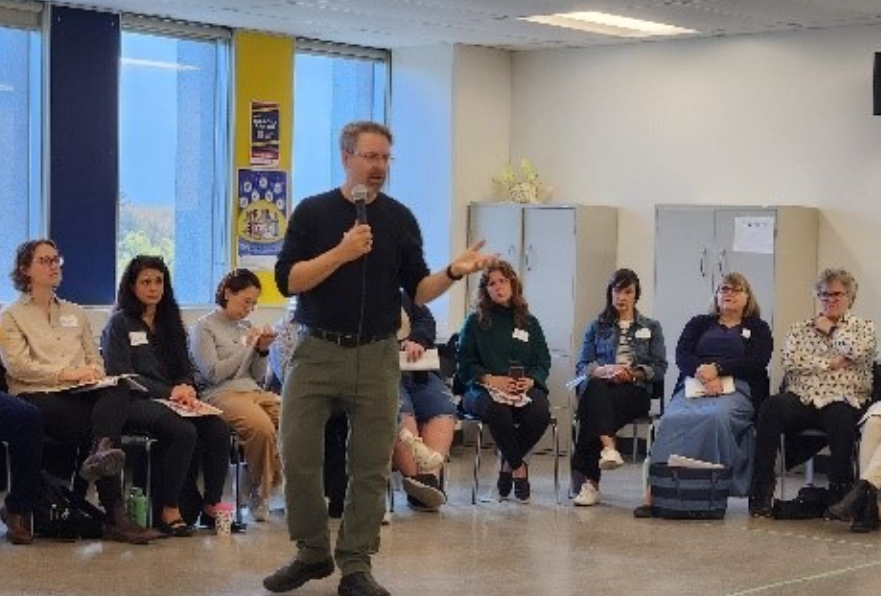
Art of Hosting with Chris Corrigan
On October 21st, 2024, CCESC offered a full-day workshop hosted by Dr. Michelle Searle and led by guest, Chris Corrigan, a specialist in community engagement, conversations and technologies.
In addition to gaining an introduction to concepts like community-engaged leadership and inviting meaningful conversation and collaboration, participants were able to bring their own ongoing or planned research to the session to work together with others to discuss, problem-solve, and gain diverse perspectives on approaching their community-engaged work.
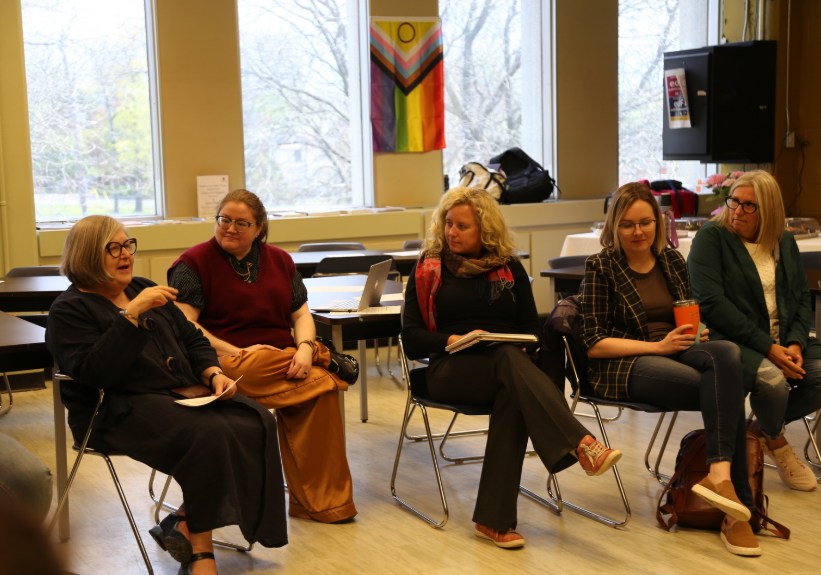
We had 58 participants from across Queen’s, Kingston, and other partners. Organizational support was provided from Jennifer Thompson and graduate students Katrina Carbone and Francois-Daniel Portelance, as well as community catering from the Boys and Girls Club of Kingston.
The Desiring Autism and Neurodivergence Symposium: Critical, Creative, Intersectional and Decolonial Perspectives
The Symposium, led by Dr. Patty Douglas, brought together over 300 neurodivergent and allied scholars, students, artists and service providers across multiple sectors to deepen collaboration, amplify training, improve services, and disseminate new neurodiversity affirming decolonized knowledge on education and aligned fields. Outputs (in progress) include an academic book, online resource hub for educators and academic article analyzing evaluation of the myriad positive impacts of the event. One attendee put it this way:
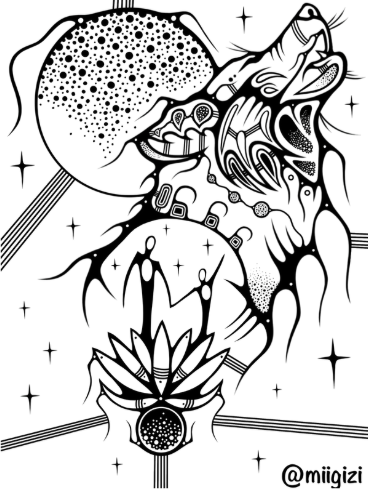
“What a positive impact acceptance and accommodation of differences makes in learning and gathering environments. I felt for one of the first times in community and academia, free, supported and encouraged to be [my] neurodivergent self.”
This three-day event was held on the Queen’s campus in July 2024 with the support of SSHRC, the CCESC, Faculty of Education, Re•Vision Centre for Art and Social Justice (Guelph) and Queen’s Office of Indigenous Initiatives. It featured live art by Anishinaabe artist Nyle Johnston, decolonizing beadwork with 2 Spirit Métis beadwork artist Claire Johnston, an online interactive art exhibit by Vanessa Dion Fletcher, a Lenape and Potawatomi neurodiverse artist, and over 40 scholarly talks.

CCESC-Invited Speaker: Music research-creation – Speculative Propositions and Transdisciplinary Failures
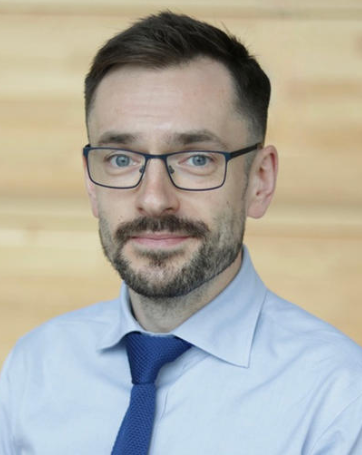
In partnership with the Arts Research Collective, CCESC co-hosted this seminar by Dr. David Ben Shannon from Manchester Metropolitan University, on the methodological possibilities and challenges of research-creation, mobilizing music composition, empirical social science methods, early years classroom practice, and electrodermal biosensors to explore new possibilities for inclusion.
Empowering Neurodivergence: Speaker Series
In partnership with Dr. Heather Brown from the AIDAN lab at theUniversity of Alberta and colleauges from Laurier University and the University of Ottawa, the CCESC hosted six in-person and online ‘Watch Parties’ featuring guest speakers with a variety of professional expertise and lived experience of Neurodivergence. The goals of these sessions was to support ongoing research in affirming and supportive practices. Speakers included an influencer, a comedian, an Olympic athlete, a coach, academics and others who shared their experiences and wisdom.
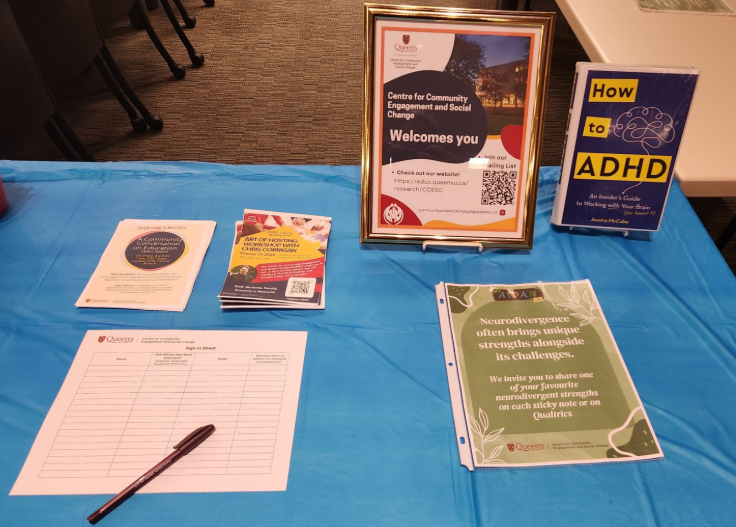
In addition to the events themselves, the planning team, including Dr. Michelle Searle and Jennifer Thompson, and our partner institutions have conducted an analysis and evaluation of the data collected from over 1000 participants regarding perceptions of and experience with Neurodivergence and neuro-affirming practices for our communities. Data collected identifies how transformative this series has been for those involved.
“It was refreshing to be in a space where people were encouraged to engage in self-observation and to be themselves. I appreciate the strengths-based and celebratory approach to difference and the focus on community and connection”
In addition to upcoming scholarly outputs, this series is part of an in-progress SSHRC connections grant Dr. Searle and Jennifer Thompson are submitting with collaborators in May 2025.


From left to right: Ian Matheson (Queen’s), Patty Douglas (Queen’s), Jessi Lalonde (LDSB), Haley Clark (Queen’s) and Ash Ward (LDSB).
Neuro-Vibes
In January 2024, the Centre, in partnership with the Limestone District School Board (LDSB) and Queen’s University Faculty of Education, launched Neuro-Vibes: A Night Exploring Neurodiversity at Duncan McArthur Hall. This event brought together over 200 educators, students, educational leaders, community members, and researchers, as well as 25 community organizations from the Kingston community to explore neurodiversity and expand understanding of neuro-affirming approaches in education through research, practice tips as well as lived experience on a panel of students and educators from LDSB.
Key principles of the event included Planning for All, Collaboration and Creating Acceptance and were embodied through access practices (including an access guide), quiet spaces (such as streaming talks in the large auditorium into the library), and affirming resources (a sensory/fidget tool station provided by a neurodivergent community member), principles and practices we carried over into Neuro-vibes 2025. Outputs include a co-authored research brief in the Ontario Principal’s The Register Magazine Spring 2025 issue and an academic book chapter (invited) analyzing evaluation data and partnership.

In 2024, the planning committee received overwhelmingly positive feedback from attendees, both in person and through an online survey. We are thrilled that many community agencies joined us for Neuro-Vibes 2025, held on April 3, 2025, and once again welcomed a crowd of over 200 attendees and community agencies, but this time at the Katarokwi Learning Centre. This year, we were committed to expanding access, inclusion and representation around racial and other diversity (e.g., fetal alcohol spectrum disorder) in autism and neurodivergence research and practice. We can’t wait for Neuoro-Vibes 2026! Thank you to our partner, team, attendees and sponsors!
RBJSE 2025 (The Rosa Bruno-Jofré Symposium in Education)
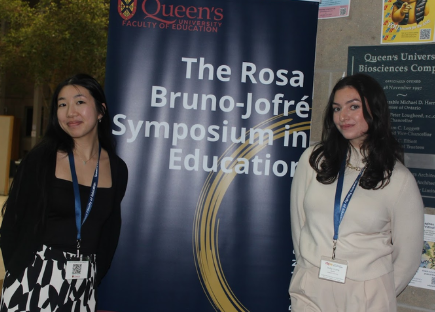
In addition to Community and researcher-initiated pursuits, CCESC is committed to supporting Student-organized Community Engagement initiatives. This year, CCESC was proud to provide a Guest Speaker grant to RBJSE, as they explored the theme of “Looking Back to Move Forward: Visions for a Just Future in Education”. The conference was well-attended and we want to commend the great voluntary work done by the organizers Cheryl Lee-Yow and Holly Crump as well as the subcommittee members for their incredible work.
Future directions for Goal 4
- Mapping existing projects, resources, and tools, and analyzing gaps to determine new resources and opportunities that need to be developed.
- Expanding partnerships and opportunities for the annual Neurovibes event by incorporating a community of practice throughout the year with interested educators, family members and students
- Scaling up the neurodiversity alliances that have emerged in LDSB high schools as a result of the initiative
- Growing our community partners, sponsorships, and donations to the event
- Exploring the possibility of expanding Neurovibes to other Ontario school boards.
- Continuing to host the Neuro-Affirming Speaker Series as a Community Building Activity through a SSHRC Connections Grant (submitted).
- Engaging with and nourishing community by funding guest speakers to bring diverse expertise and voices into the faculty.
- Collaborating with the faculty and research groups to prioritize current research interests and needs.
- Collaborating with the CAB to establish a vision for developing a pilot that supports a community-driven project grant in the 2025-2026 funding cycle.
- Proposing community engagement and social change as a focus for a future Rosa Bruno-Jofré Symposium in Education, with a symposium output.